Introduction to Autism Evaluation Costs and Considerations
Determining the cost of an autism evaluation is a common concern among individuals and families. While prices can vary widely based on numerous factors, understanding what influences these costs and exploring available resources can help manage expectations and facilitate access to essential diagnostic services.
Range of Typical Evaluation Costs in the US
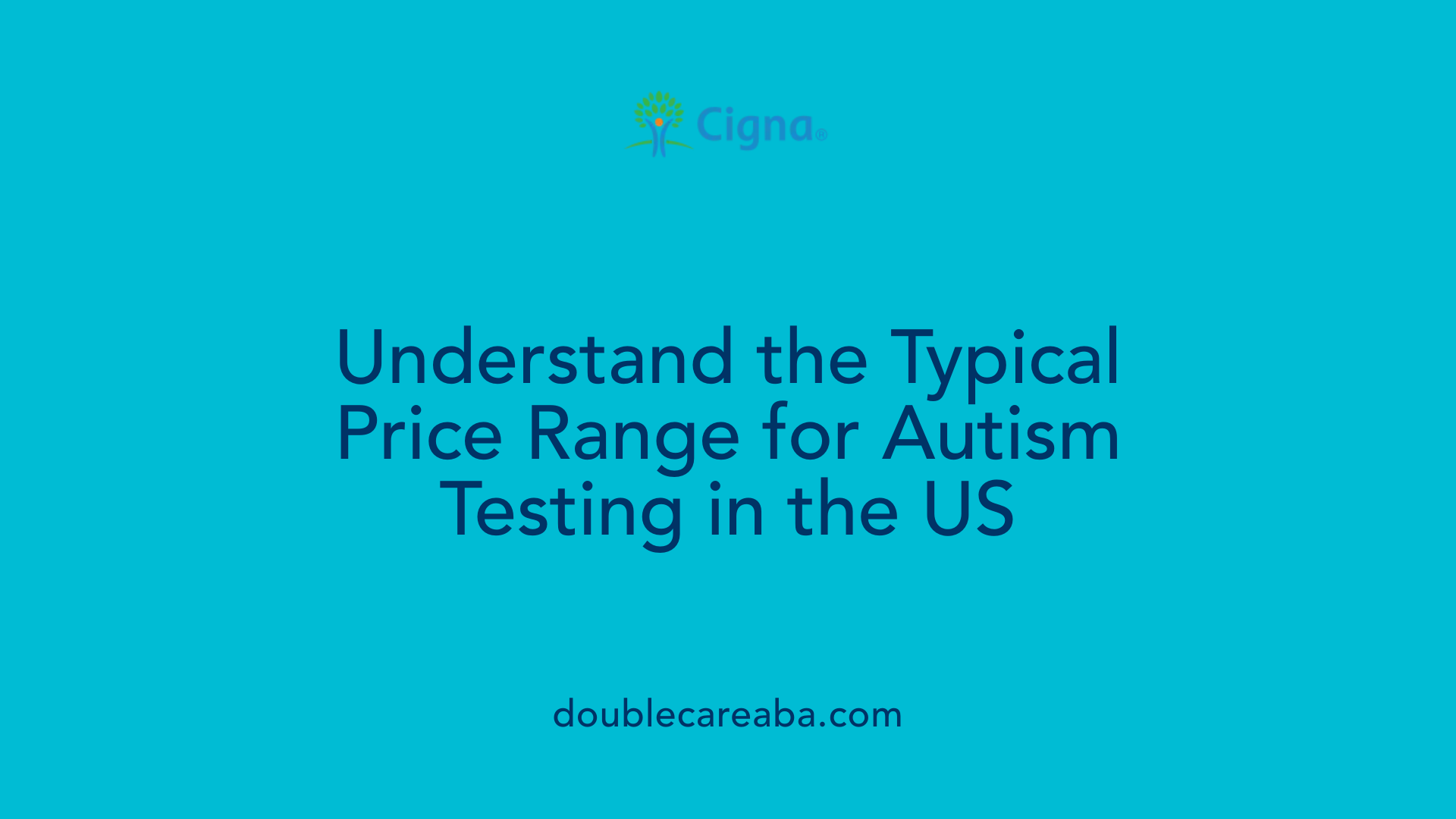
What are the typical costs of autism evaluations?
In the United States, the expense of autism testing can vary widely based on several factors. Generally, the price for an autism assessment ranges from $250 for basic evaluations to over $5,000 for comprehensive testing. Typical diagnostic evaluations usually cost between $1,000 and $3,000, while developmental evaluations tend to fall within $1,500 to $4,000. For adults, assessments such as the one offered in California can range from $1,000 to $5,000, depending on the provider and location.
Differences in costs for comprehensive vs. basic assessments
Basic autism assessments are often less costly, starting around $250 to $800. These include initial screening or shorter evaluations focusing mainly on core autism traits. Comprehensive assessments, which include detailed history reviews, behavioral observations, standardized tests, and reviews of cognitive, speech, and sensory functions, typically cost between $1,200 and $5,000 or more. The more extensive the evaluation, the higher the price, especially when involving multiple professionals or complex assessment tools.
Case study examples from different regions
The variation in prices can be seen across different locations. In New York City, some evaluations have been reported at approximately $3,000, while in California, costs for similar assessments tend to average around $2,500. In Texas, costs can be significantly lower, around $1,200. Similarly, UCLA charges approximately $5,000 to $6,000 for adult autism assessments. These regional differences are influenced by local healthcare costs, provider expertise, and available resources.
| Location | Average Cost Range | Notes |
|---|---|---|
| New York City | ~$3,000 | Higher due to urban healthcare costs |
| California | $1,000 - $5,000 | Varies across providers and evaluations |
| Texas | ~$1,200 | Typically more affordable |
| UCLA (Adult assessment) | $5,000 - $6,000 | Specialized program for adults |
Understanding these variations helps families and individuals plan budgets and explore financial aid options effectively.
Factors Affecting Evaluation Costs
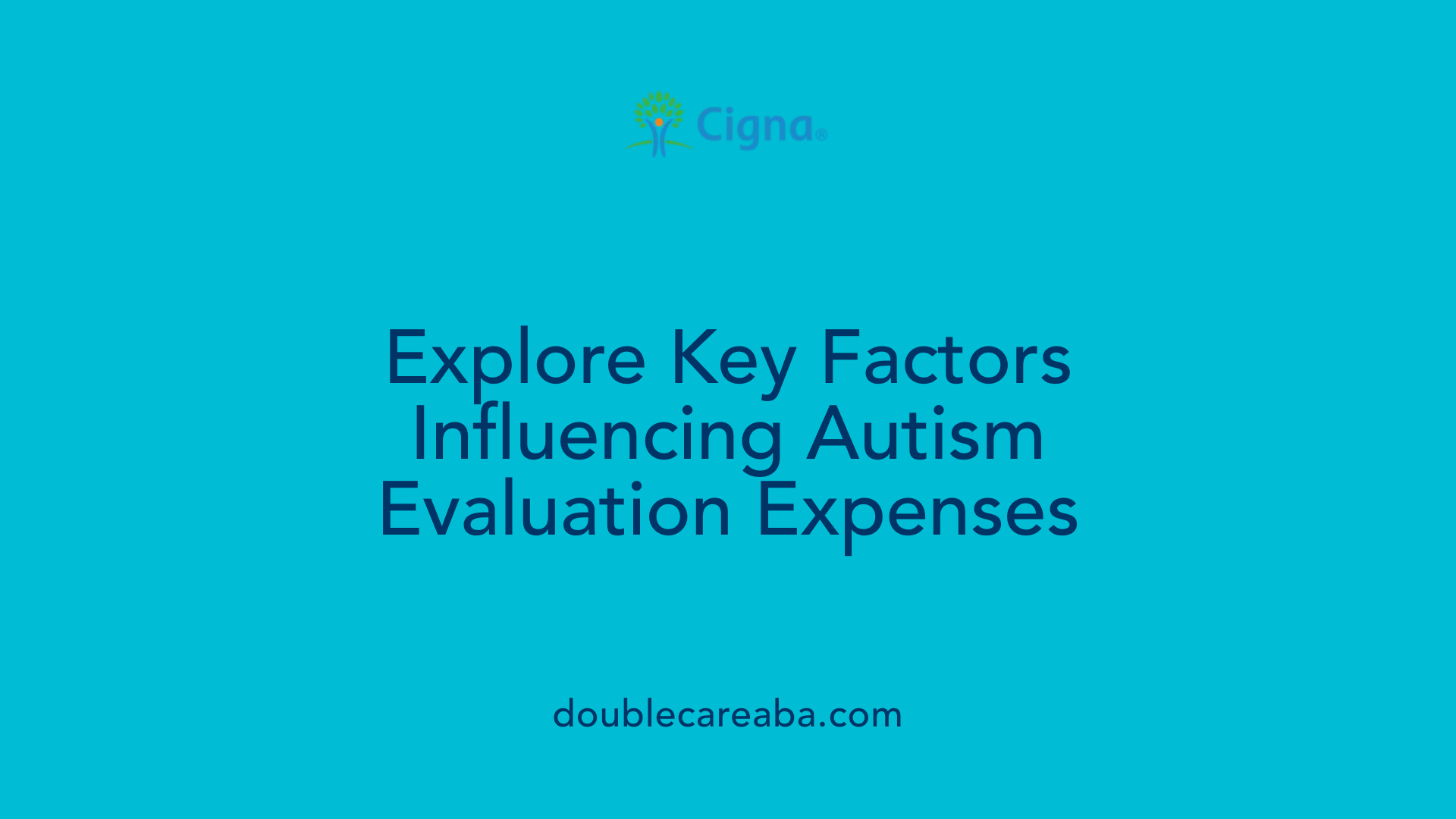
What factors influence the cost of autism assessments?
Several elements come into play when determining the price of autism evaluations. One of the most significant factors is the professional expertise and credentials of the evaluators. Qualified specialists such as clinical psychologists, neuropsychologists, or developmental pediatricians typically charge higher fees due to their specialized training and experience.
The type and scope of the assessment also impact the overall cost. For example, a simple diagnostic evaluation might be less expensive, while comprehensive assessments that include multiple testing components, behavioral observations, and evaluations for co-occurring conditions tend to cost more. These detailed evaluations often take longer and require additional resources.
Geographic location is another key factor. In major urban centers like New York City or Los Angeles, high living costs and demand often mean higher fees. Conversely, evaluations may be more affordable in smaller cities or regions like Texas or some parts of the Midwest. For example, some evaluations can range from as low as $1,200 in Texas to over $5,000 in California.
Assessment tools used during evaluations contribute to costs as well. Licenses for specialized standardized testing materials are necessary, and their fees are factored into the overall price. The administration of these tools requires trained professionals, adding to the expense.
Insurance coverage and financial assistance options can significantly reduce out-of-pocket costs. Many families benefit from Medicaid, state programs, or nonprofit initiatives like Autism Speaks. Some providers also accept financing options such as CareCredit or offer sliding scale fees based on income, making evaluations more accessible.
In conclusion, autism assessment costs are affected by a combination of professional qualifications, evaluation scope, regional costs, assessment technology, and available financial aid. Planning ahead and exploring multiple resources can help families manage these expenses effectively.
What an Autism Evaluation Usually Includes
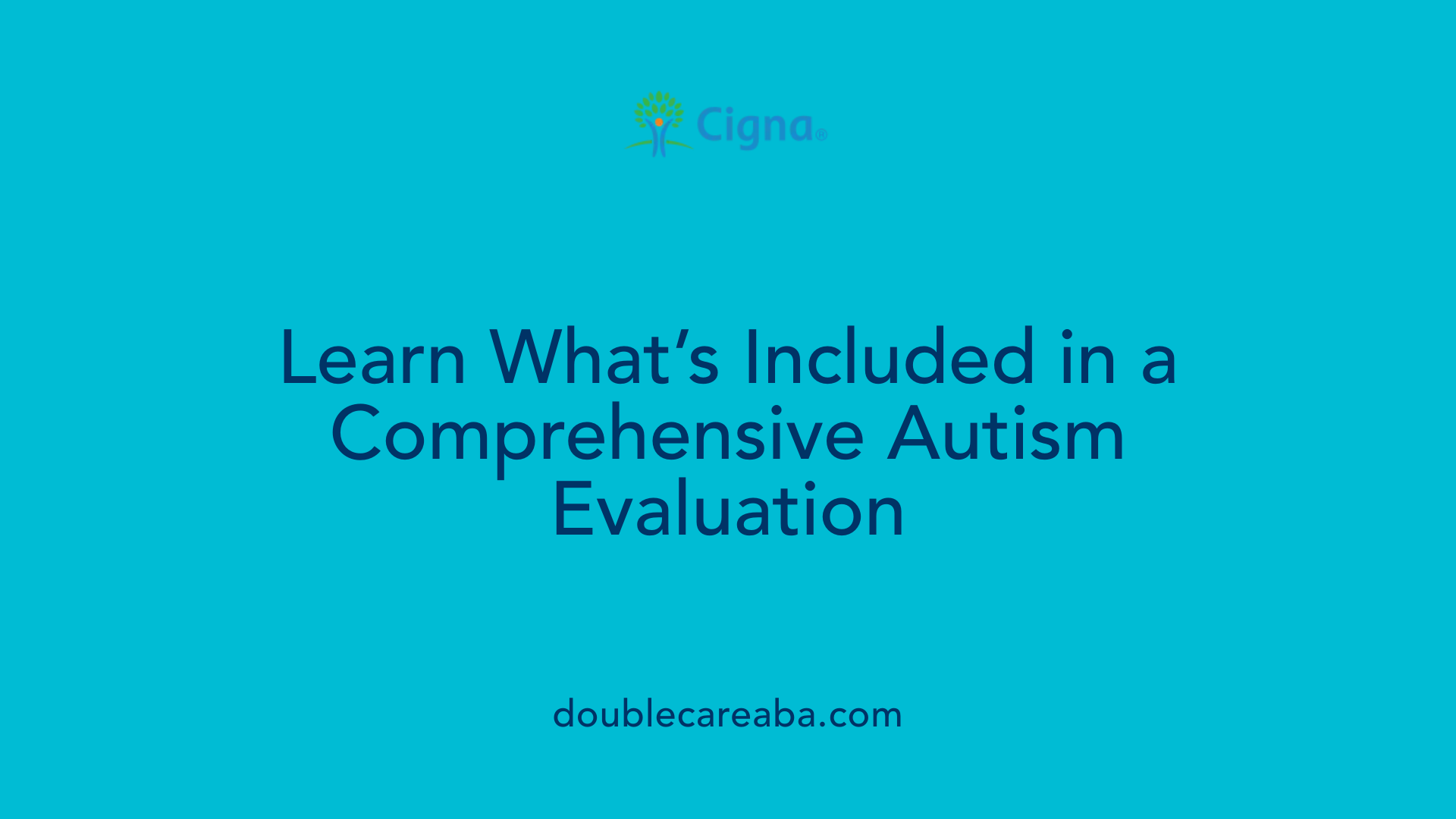
What does the cost of an autism evaluation typically include?
An autism evaluation usually involves a thorough process that helps professionals understand an individual's development and behavior. The core components often include interviews with the individual being evaluated and their family members. These discussions help gather detailed developmental history and current functioning.
A critical part of the assessment is behavioral observation, where clinicians watch how the person interacts, communicates, and responds to various prompts. Standardized assessments like the Autism Diagnostic Observation Schedule (ADOS) are frequently used to systematically evaluate autism traits.
Additional assessments might be part of the process, such as speech and language evaluations to assess communication skills. Cognitive or neuropsychological testing can offer insights into thinking, learning, and sensory processing. Screening for co-occurring conditions like anxiety, depression, or ADHD further clarifies the individual's needs.
The overall costs of an autism evaluation depend on multiple factors. These include the type of professionals involved, assessment tools, location, and evaluation length. Prices typically range from $1,000 to over $5,000. Insurance and government programs can help cover some or all costs, making evaluations more accessible.
Low-cost options include community health centers, university research programs, and public school assessments. Many providers now offer detailed reports with diagnostic criteria, developmental summaries, and tailored recommendations. This comprehensive approach equips families and individuals with information to pursue appropriate interventions and support services.
| Component | Purpose | Typical Cost Impact |
|---|---|---|
| Interviews with individual and family | Gather developmental and behavioral history | Included in overall evaluation fee |
| Behavioral observations | Observe interaction and social skills | Incorporated into assessment procedures |
| Standardized assessments (e.g., ADOS) | Objectively measure autism traits | Major cost contributor, varies by provider |
| Speech, cognitive, sensory evaluations | Identify specific strengths and challenges | Add to total cost, can increase fees |
| Screening for co-occurring conditions | Detect secondary issues that may need treatment | Often included but may incur extra costs |
Exploring these components helps clarify what goes into an autism evaluation and how costs are determined. Planning ahead ensures families can select a suitable evaluation setting and budget accordingly.
Insurance Coverage and Reimbursement Policies
Does insurance typically cover autism testing for children and adults?
Insurance coverage for autism testing can vary widely depending on the type of plan, provider, and location. In general, most private health insurance policies, especially those offered through employers, usually cover autism assessment if the test is considered medically necessary. However, the specific procedures, assessments, and evaluations included in coverage differ from plan to plan.
Medicaid and other state-based programs may also help cover these costs. Many states have mandates that require insurance providers to include some coverage for autism-related services, including diagnostic assessments. That said, coverage for adults can be less comprehensive and varies across states.
For children, insurance often covers initial screenings, evaluations, and some therapies. For adults seeking diagnoses, coverage options may be more limited but are gradually improving. Currently, in 2025, some plans are beginning to include autism testing as a covered benefit, but many still do not.
It is very important for individuals and families to contact their insurance providers directly to understand what specific services are covered. This can include asking about covered procedures, required authorizations, copayments, and coinsurance responsibilities.
What is the role of Medicaid and state programs in covering costs?
Medicaid and regional programs play a crucial role in helping cover autism assessment expenses, especially for low-income families. Medicaid often covers the full cost of evaluations, including the use of specialized assessments, depending on state policies and individual eligibility.
Some state programs also offer additional financial assistance through grants, subsidies, or regional centers that support diagnostic evaluations. For example, in California, programs such as Medi-Cal provide coverage for autism assessments, reducing out-of-pocket costs significantly.
These programs are vital for those who lack private insurance or whose plans have limited coverage. Eligibility depends on income, residency, and other criteria, making it essential to explore local options.
Are there pre-authorization requirements or documentation needed?
Many insurance plans require pre-authorization or prior approval before covering autism evaluations. This process involves submitting documentation from healthcare providers that justifies the medical necessity of the assessment.
Providers may need to include detailed reports, previous records, or developmental histories. In addition, some plans require specific diagnostic codes to process claims properly.
Failure to obtain pre-authorization can result in denied claims, so it’s important to confirm the process with your insurer beforehand.
What are out-of-pocket expenses with insurance, such as copays and coinsurance?
Even with insurance coverage, individuals often pay out-of-pocket costs like copayments, deductibles, and coinsurance. The typical copay for an autism assessment can range from $20 to $100 per visit.
Coinsurance, which is a percentage of the total cost shared by the insured, usually ranges from 10% to 40%. For example, if an evaluation costs $2,000 and coinsurance is 20%, the individual pays $400.
These costs can add up, especially if multiple assessments, follow-up appointments, or additional services are needed.
What impacts cost and coverage starting June 2025?
Starting from June 2025, insurance plans in some states will be required to offer more comprehensive coverage for autism diagnosis and related services. This change aims to reduce the financial burden on families and individuals.
However, most states have not yet fully implemented these policies, so coverage remains inconsistent. It’s anticipated that more plans will include autism assessments as standard benefits, including adult evaluations.
In the meantime, families should keep abreast of policy updates, check their insurance plans, and leverage available support programs and community resources to help manage costs.
Finding Financial Assistance and Low-Cost Testing Options
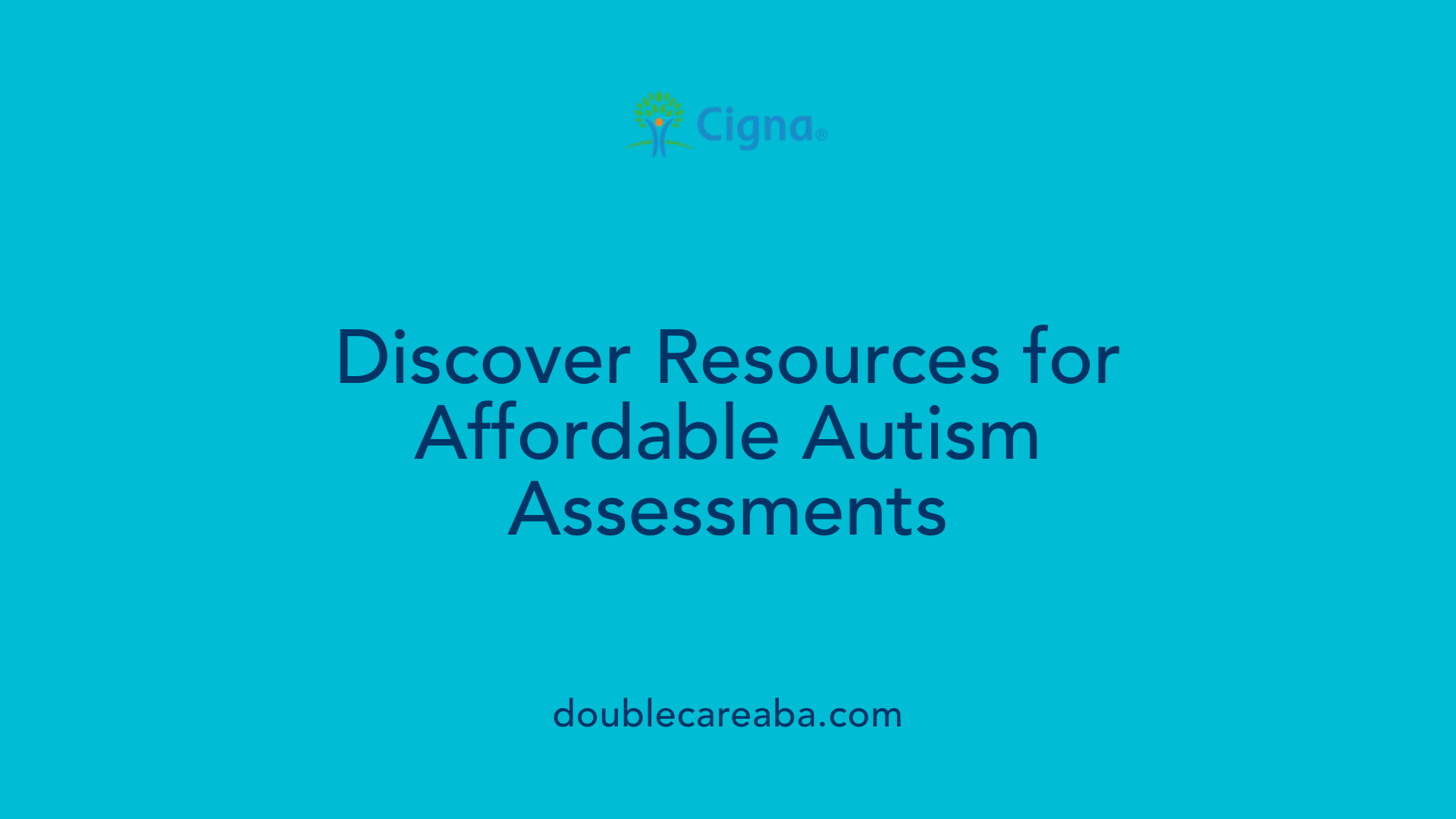 Individuals and families seeking financial assistance or low-cost autism assessments have several avenues to explore. One of the first steps is to look into government programs such as Medicaid and Supplemental Security Income (SSI), which can significantly reduce out-of-pocket costs for eligible individuals. Medicaid, especially in states like California where autism-related services are mandated to be covered, can help pay for evaluations and ongoing therapy.
Individuals and families seeking financial assistance or low-cost autism assessments have several avenues to explore. One of the first steps is to look into government programs such as Medicaid and Supplemental Security Income (SSI), which can significantly reduce out-of-pocket costs for eligible individuals. Medicaid, especially in states like California where autism-related services are mandated to be covered, can help pay for evaluations and ongoing therapy.
Beyond government assistance, community resources play a vital role. Local clinics, public health centers, and early intervention programs often offer free or sliding-scale assessments for children. Public schools may also provide evaluation services or support through special education programs, making it easier for families to access initial assessments without major expenses.
Organizations like Autism Speaks provide grants and scholarship opportunities to help offset the costs of testing, therapy, and equipment. Their Autism Care Today’s Quarterly Assistance Program, for example, offers financial aid directly to families in need. Additionally, regional centers and specialized aid programs in many states can facilitate access to diagnostic services and ongoing support, often at reduced costs.
Navigating insurance options is also crucial. While some insurance plans cover autism evaluations, it’s important to verify coverage details and pre-authorization requirements. For those without insurance or with limited plans, many providers offer receipts for payment reimbursement, especially if they do not accept insurance directly.
Tips for success include researching local and national programs, contacting autism support organizations for guidance, and applying for available grants, scholarships, or waivers. Consulting with local advocacy groups or regional centers can help families identify specific resources tailored to their location and circumstances.
By being proactive and leveraging various support systems, families can make autism testing more affordable and accessible, ensuring early diagnosis and intervention are within reach.
Cost Disparities Between Children and Adults
Are there differences in costs for autism assessments between children and adults?
Yes, the expenses related to autism evaluations do differ significantly between children and adults. Typically, assessments for children fall within an average range of about $975 to $1,500. These evaluations often involve around 13 hours of professional work, including behavioral observations, standardized testing, and developmental history reviews. Many children’s assessments are supported by public or community programs, which can help alleviate costs.
For adults, the assessment process tends to be more detailed and comprehensive, resulting in higher expenses. Adult autism evaluations generally cost between $2,000 and $6,000. This higher price reflects the additional complexity involved, such as in-depth cognitive testing, social and adaptive functioning assessments, and screening for co-occurring conditions like depression or anxiety.
Several factors contribute to the cost differences. Adult evaluations often require more extensive assessments to establish a diagnosis due to the complexity of adult development and the need to review previous developmental histories. Moreover, the scope of the assessment, provider expertise, and geographic location can influence the overall cost. Insurance coverage can help mitigate expenses for both children and adults but might be more readily accessible for children through public health programs.
In summary, adult autism assessments tend to be higher in cost primarily due to the complexity and comprehensive nature of testing required. Meanwhile, children's assessments are more standardized and often supported by additional resources, making them relatively more affordable.
Provider Type and Geographic Location's Effect on Cost
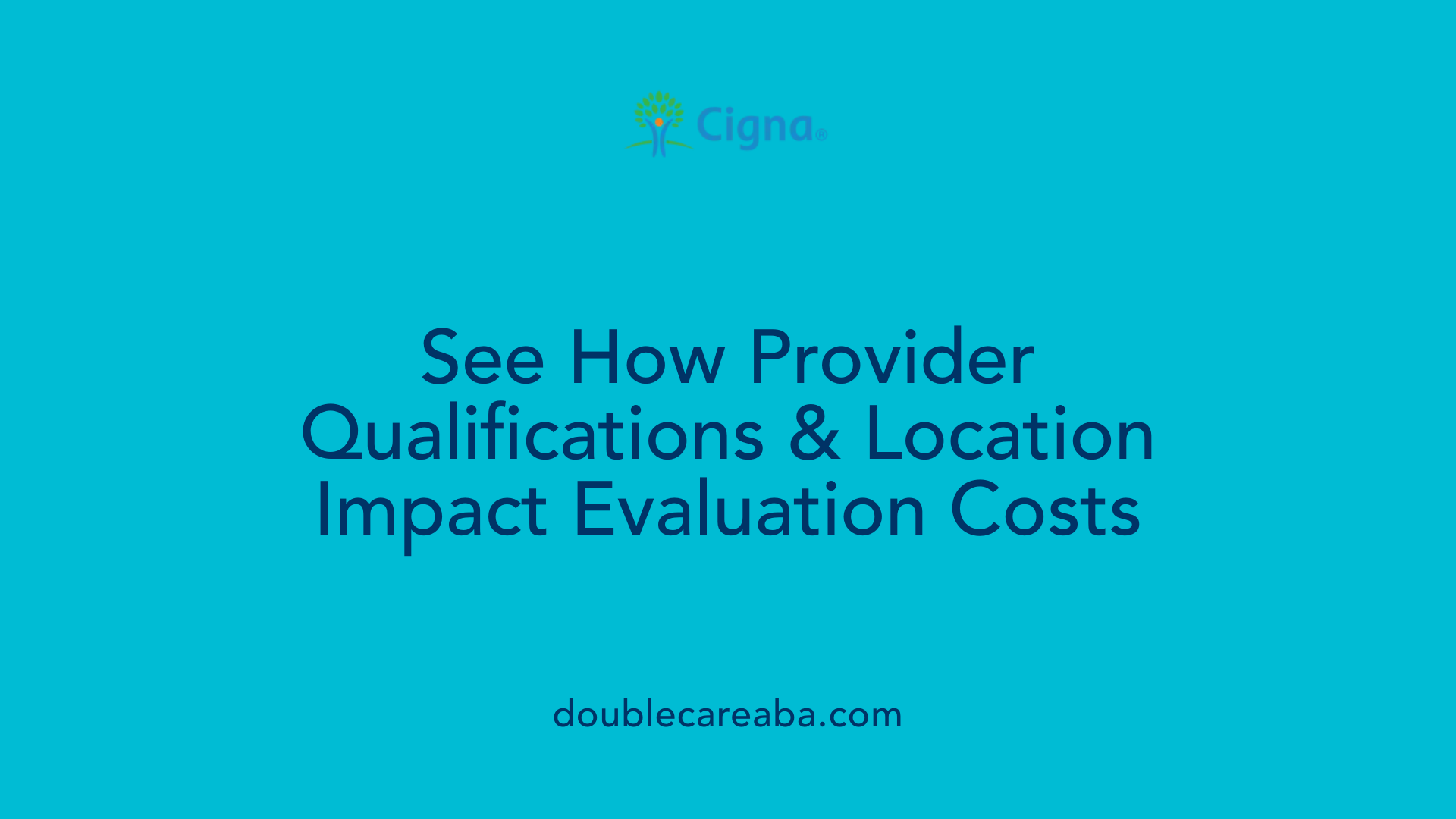
How do provider type and location affect the cost of autism evaluations?
The price of autism evaluations can vary widely depending on the type of provider conducting the assessment and the location where it takes place. Different professionals bring varying levels of expertise and charge different fees, which significantly impacts overall costs.
Neuropsychologists, clinical psychologists, pediatricians, and developmental specialists are among the most qualified providers to diagnose autism. Typically, neuropsychologists and developmental pediatricians have higher fees, often ranging from $2,000 to $9,000 for a comprehensive assessment. Psychologists may charge between $1,000 and $3,000 for basic evaluations, with costs increasing based on the scope of testing.
The geographic area also plays a crucial role. Urban centers like Los Angeles, San Francisco, and New York City tend to have higher living expenses, which translates into elevated service charges. In these cities, autism evaluations can cost between $3,000 and $10,000, especially when involving multidisciplinary teams and advanced diagnostic tools.
Conversely, rural or less densely populated areas generally offer lower evaluation costs, sometimes as affordable as $1,000 to $2,500. These lower prices are often linked to reduced living costs and a smaller demand for specialized services.
The complexity of the evaluation influences costs further. A basic assessment focusing solely on behavioral observations may be less expensive than a comprehensive, multidisciplinary evaluation that includes cognitive testing, speech and sensory assessments, and co-occurring condition screenings.
How do insurance impacts vary based on state laws and provider networks?
Insurance coverage can substantially reduce out-of-pocket expenses for autism evaluations. Some states enforce laws requiring health plans to cover autism diagnostic services, which can lower costs in states like California. However, in many regions, coverage may depend on the specific insurance provider and plan, with some requiring pre-authorization.
Provider network restrictions also affect costs. In-network providers typically have negotiated rates, decreasing patient expenses. Out-of-network providers might charge higher fees, and patients are responsible for a larger portion of the costs.
Overall, understanding these regional and provider-related factors helps families better plan for the financial aspects of autism diagnosis and access quality care efficiently.
| Provider Type | Typical Cost Range | Influencing Factors |
|---|---|---|
| Neuropsychologist | $2,000 - $9,000 | Experience, location, assessment scope |
| Psychologist | $1,000 - $3,000 | Basic vs. comprehensive testing |
| Pediatrician/Developmental Specialist | $1,000 - $4,000 | Location and expertise |
| Location Type | Cost Range | Description |
|---|---|---|
| Urban (e.g., Los Angeles, NYC) | $3,000 - $10,000 | Higher costs due to living expenses |
| Rural/Suburban | $1,000 - $2,500 | Lower costs, fewer specialists |
Understanding the interplay of provider choice, location, and insurance coverage can help families navigate and budget for autism evaluations better.
Procedural Influences on Evaluation Cost
How do procedures involved in autism testing influence the overall costs?
The procedures used during autism evaluations play a major role in determining the total expense. One of the most significant factors is the duration and complexity of testing sessions.
Longer assessments typically require more professional time, increasing costs. For example, comprehensive evaluations that last several hours—sometimes exceeding eight hours—entail additional staffing, detailed documentation, and multiple testing phases. These extended procedures naturally lead to higher charges.
The number of healthcare professionals involved also impacts the cost. Some assessments involve a team of specialists such as psychologists, neuropsychologists, psychiatrists, and developmental pediatricians. Each professional's rate varies, and their combined involvement adds to the overall expenditure.
Moreover, the use of advanced assessment tools and genetic testing further influences expenses. Standardized instruments like the Autism Diagnostic Observation Schedule (ADOS) are common, but more detailed or specialized tools—including genetic analyses—are more costly, especially when they provide additional insights into underlying conditions.
Delays and the necessity for repeat assessments can also escalate costs. Access issues such as workforce shortages, limited insurance reimbursement, or geographic barriers can cause prolonged wait times or additional testing needs if initial results are inconclusive.
Geography and provider expertise further modify costs. Generally, evaluations in large metropolitan areas or regions with high professional fees tend to be more expensive. Insurance coverage plays a role here too; while some plans reduce out-of-pocket expenses, gaps in coverage may lead to families bearing the full costs.
In conclusion, the evaluation procedures—including duration, test complexity, professional involvement, and access factors—are central to understanding the overall expenses of autism diagnostic testing.
Planning and Navigating Autism Evaluation Costs
Understanding the variety of factors that influence autism evaluation costs—from provider credentials to geographic location—can help families and individuals better plan financially. Exploring insurance options, financial assistance programs, and community resources is essential for making these evaluations accessible and affordable. By being proactive and well-informed, families can ensure timely diagnosis and access to vital support and interventions, ultimately improving outcomes for those on the spectrum.
References
- How Much Does an Autism Evaluation Cost? See 3 ...
- Reasonable Accessible Adult Autism Assessment
- What to expect when getting an adult ASD diagnosis
- How Much Does Autism Testing Cost?
- How Much Does an Autism Evaluation Cost Without ...
- Our Fees | Sachs Center | Autism & ADHD Testing and ...
- How Much Does an Autism Diagnosis Cost in California?
- Financial assistance resources
- Autism grants for families
- Autism Services | Department of Human Services













